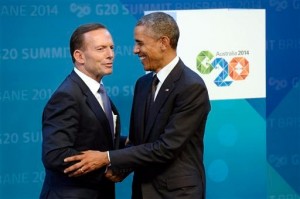G-20 summit opens in Australia; growth tops agenda

United States President Barack Obama, right, shakes hands with Australian Prime Minister Tony Abbott as he arrives at the G-20 Summit in Brisbane, Australia Saturday, Nov.15, 2014. AP
BRISBANE, Australia—Australia’s prime minister vowed that world leaders would deliver on an initiative to add $2 trillion to global Gross Domestic Product, promising freer trade and more investment in infrastructure as heads of the 20 largest economies began cementing plans to drag sagging growth out of the doldrums.
Prime Minister Tony Abbott, who has repeatedly promised this year’s Group of 20 gathering in the Australian city of Brisbane would be more than a talkfest, said the growth plans would add millions of jobs and boost global GDP by “more than 2 percent” above expected levels over the next five years.
“That is millions of jobs and trillions of dollars in extra production,” Abbott said as he officially opened the two-day G-20 conference. “Yes, we want freer trade and we will deliver it. Yes, we need more infrastructure and we will build it,” he said.
“This is our message to the world: that governments can deliver, that governments can agree that the world can be better, that there can be higher jobs, higher growth and more jobs.”
G-20 nations, which represent 85 percent of the global economy, are under pressure to take definitive action at this year’s summit, rather than simply producing a set of vague, unmeasurable goals. The International Monetary Fund has warned about a “new mediocre” for the world economy, putting renewed focus on the G-20’s growth initiative.
Article continues after this advertisementEach country is expected to present a comprehensive plan at the summit on how they will achieve their contribution toward the $2 trillion goal, but whether the communique will reveal any of those details is unclear. World GDP this year is about $77 trillion.
Article continues after this advertisementAustralian Treasurer Joe Hockey said the group’s growth strategies include 1,000 measures that will lift infrastructure investment, increase trade and competition, cut red tape and increase employment.
“While we still face economic challenges in many parts of the world, I’m optimistic our 2 percent commitment will deliver the growth the world needs,” Hockey said.
But rights groups such as The Civil Society 20 group, or C20, want assurances that the poor will benefit the most from the plans, estimating that the additional growth could lift 1 billion people out of poverty if it was poured into the poorest 20 percent of G-20 households.
Before intensive talks could begin, however, leaders took time out to enjoy a traditional Aussie barbecue at the state Parliament House, feasting on king prawns, oysters, lamb and pavlova, a popular meringue dessert generally served with fruit and whipped cream.
Several of the leaders’ spouses visited a local wildlife sanctuary where they cuddled up with koalas and fed kangaroos.
Dignitaries were then greeted by a traditional Aboriginal welcome ceremony, featuring singing, dancing and the solemn hum of a didgeridoo, before entering their first official closed-door meeting.
Outside the convention center where the summit is taking place, hundreds of protesters braved a scorching heat wave and labyrinth of roadblocks to stage rallies demanding everything from action on climate change to banning Russian President Vladimir Putin from the gathering.
Despite fears of mass arrests and violence, the protests have been largely peaceful. Two activists were detained for questioning; an Associated Press photojournalist saw police take two gas masks and a pocket knife out of their bags before escorting them away. Knives and gas masks are on a lengthy list of banned items in the city this weekend; prohibited items also include eggs, guns, kites and reptiles.
Six thousand police officers were on duty to maintain order, many dumping bottles of water on themselves to cope with temperatures that are expected to reach 40 degrees Celsius (104 Fahrenheit) on Sunday.
The summit will conclude on Sunday with the release of an official communique, a rundown of what the countries have achieved and want to achieve in the future.
Tax avoidance by big, multinational companies was expected to be high on the agenda, particularly in light of the recent leak of documents suggesting that hundreds of big companies such as Pepsi and IKEA had organized tax-lowering deals with Luxembourg.
The tiny European nation’s neighbors reacted angrily to the news, noting that they have had to impose harsh austerity measures on their own citizens to keep government budgets afloat following the global recession.
On Saturday, Jean-Claude Juncker, two weeks into his new job as European Commission president, faced tough questioning about his tax record as prime minister of Luxembourg for 18 years.
During a press conference on the sidelines of the G-20, he was grilled about whether Luxembourg was guilty of “picking people’s pockets” while he was the nation’s leader, and asked whether he could be considered a credible representative of the European Union on the issue of tax avoidance, given his ties to Luxembourg.
Juncker largely deflected the questions.
RELATED STORIES
Brisbane airport bans corruption ad ahead of G20